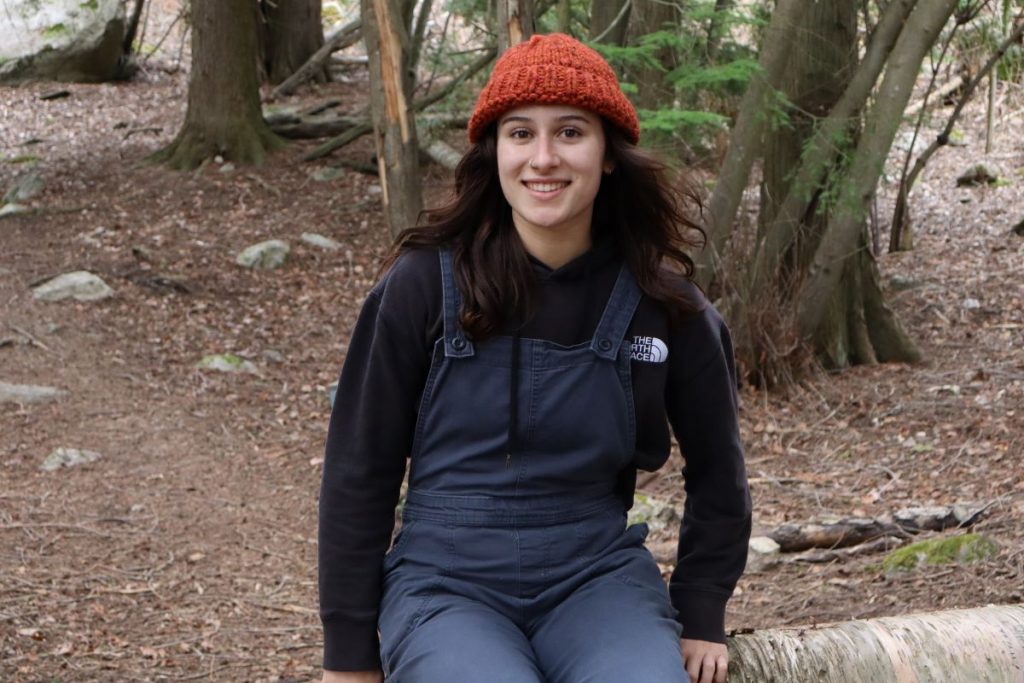Castlegar Forestry student says her future industry can do better
A Living Here Feature Ari Lord and Anna Dulisse
Three weeks after graduating high school on a perfect sunny day, Gracie Smith bid farewell to her mom, stepdad, brother, nanny, and poppa before embarking on a nine-hour drive southeast from her hometown of Quesnel, British Columbia. She was both nervous and excited to study Forestry Technology at Selkirk College in Castlegar. Her passion for forestry, however, had begun years earlier.
“When I was 14, I worked at a tree sapling manufacturer,” she recalls. “I thought I’d be a tree planter, but a woman I worked with suggested forest technology, and that’s the path I chose.”
Gracie, now 19 years old, wanted to leave home and make new friends and experiences, but she still holds a deep affection for Quesnel.
“It’s got that small-town charm. Everyone is polite and friendly, and I feel safe here,” she says.
Gracie’s family roots in Quesnel run deep. Her nanny Maddy and poppa Vic owned a Shell station, and her Grandpa Paul started the Smith Brothers Logging company. Later, her father and uncle became involved in the forestry industry as well.
“I still meet people who say, ‘I worked for your grandpa way back when.’”
In 1952, there were 180 registered sawmills in Quesnel, a town with less than 4,000 residents at the time. (Photo credited to Quesnel & District Museum and Archives)
It’s a Log Road
Gracie didn’t think a lot about the local mills or logging around Quesnel growing up, but her first year of college caused her to reflect on an industry that has sustained her family and community for decades.
In her short lifetime however, she’s seen firsthand how much the industry has changed, especially with mill closures.
“I remember being in grade seven, and people were like, ‘my dad doesn’t have a job now,’” says Gracie, recalling the impact on families in Quesnel. “There was a huge layoff. It was a big deal when the mills closed.”
The mills that did remain open were all purchased by one company, West Fraser. Most of Gracie’s friends who have stuck around Quesnel work at West Fraser or one of its subsidiaries.
While Gracie is grateful this company is employing friends and family members in her hometown, she also has some concerns.
Gracie has learned a huge amount about B.C. forests in her year studying forestry, and brings these new ideas to the dinner table when she visits home.
While Gracie supports the B.C. forestry industry and wants to continue her family’s legacy of working in the woods, she finds logging the province’s remaining old growth unacceptable.
As she learns more in school, Gracie feels torn between anger and understanding.
“Part of me jumps to conclusions—this is wrong. But another part rationalizes… people have spent their whole lives doing this.”
The Answer Doesn’t Fall Far from the Tree
Gracie believes the core issue is how forests are managed in B.C.
“The way profit is more important than sustainability has to change,” says Gracie. “We need to plant more trees, get more reforestation and less monoculture happening, because it’s either burning or being logged.”
Though some blame loggers for the state of forestry, she believes, “You can’t be mad at the loggers or mill workers. It’s the CEOs pulling the strings, and that’s frustrating.”
Gracie, with family in forestry, recently toured the mill where her stepdad works in Quesnel.
“I didn’t want to be naive. These are the people my career decisions will impact. It’s people’s lives. We need to preserve that, but also the world.”
She believes respectful conversations with those in the industry are key.
“If we want to work and live, we need to talk about this.”
Gracie hopes forestry practices in B.C. will a shift from profit-driven model for corporations, to more sustainable practices for communities.
Doing Better, Together
Grace believes that the forestry industry can no longer rely on business as usual and that there are better ways to protect both jobs and forests.
Last year, she learned about a proposal to change forest management in B.C. called the Biodiversity and Ecosystem Health Framework. If enacted, this framework would prioritize the health of entire forests—along with the plants, animals, and people who depend on them—over the interests of corporations.
“Having B.C.’s Biodiversity and Ecosystem Health Law… that would mean a lot to see that being prioritized.”
Gracie would love to see more people like her, who grew up or are still living in forestry towns like Quesnel, ask their government to change the way they are managing B.C.’s forests. And she hopes that because it’s an election year, those in power might listen.
“Putting pressure on politicians is huge.”
Gracie thinks there are better ways to protect jobs and forests.
Balancing tradition and change
For a 19 year old, Gracie seems wise for her age.
She understands and respects the history of an industry that has supported her family, friends and community and at the same time, she believes there needs to be a shift in how we view nature and manage these resources.
To get there, she’s happy to do her part.
“We can’t talk to the CEO of West Fraser, but we can raise awareness among employees and advocate for prioritizing biodiversity from within,” Gracie says. “I want a future. I want to be part of the change and change for the better.”
Gracie is looking forward to her second year in college, and working for a forestry industry that it is the best it can be.
Living Here is Authorized by and a project of Neighbours United, registered sponsor under the Election Act, info@neighboursunited.org


























Comments